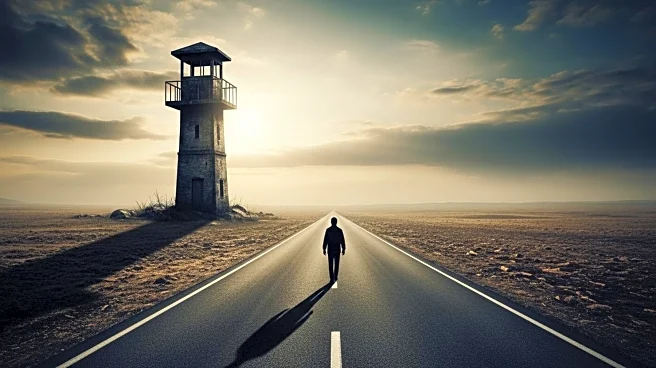What's Happening?
Stephen King's novel 'The Long Walk' has been adapted into a film, reflecting a dystopian vision of the United States post-Vietnam. The story centers around a brutal competition where participants must maintain a walking pace above 3.1 miles per hour or face death. The winner receives a substantial cash prize and a wish granted, with the event promising to restore America's economic dominance. Fifty young men enter the contest, but only one can emerge victorious after enduring a grueling 300-mile journey. The adaptation fits within the genre of dystopian films like 'The Hunger Games' and 'The Maze Runner,' offering a dark commentary on societal pressures and survival.
Why It's Important?
The adaptation of 'The Long Walk' underscores the enduring appeal of dystopian narratives in exploring societal and economic themes. By presenting a competition that promises economic revival, the film taps into contemporary concerns about economic instability and the lengths individuals might go to secure prosperity. This narrative resonates with audiences who are increasingly aware of the pressures to succeed in a competitive world. The film's release could spark discussions about the ethical implications of such competitions and the societal values they reflect, potentially influencing public discourse on economic policies and social priorities.
What's Next?
As 'The Long Walk' enters the public sphere, it may prompt reactions from various stakeholders, including filmmakers, critics, and audiences. The film could inspire further adaptations of Stephen King's works, given its thematic relevance and potential commercial success. Additionally, discussions around the film might lead to broader conversations about the role of dystopian narratives in shaping public perceptions of economic and social issues. The film's reception will likely influence future projects within the genre, as creators seek to address similar themes in innovative ways.
Beyond the Headlines
The adaptation of 'The Long Walk' invites deeper reflection on the cultural fascination with dystopian scenarios and their implications for real-world issues. The film's portrayal of a competition with life-or-death stakes raises questions about the ethical boundaries of entertainment and the societal obsession with winning at all costs. It also highlights the potential for dystopian narratives to serve as cautionary tales, urging audiences to consider the consequences of unchecked ambition and the pursuit of economic dominance. This cultural exploration may lead to a reevaluation of values and priorities in contemporary society.











